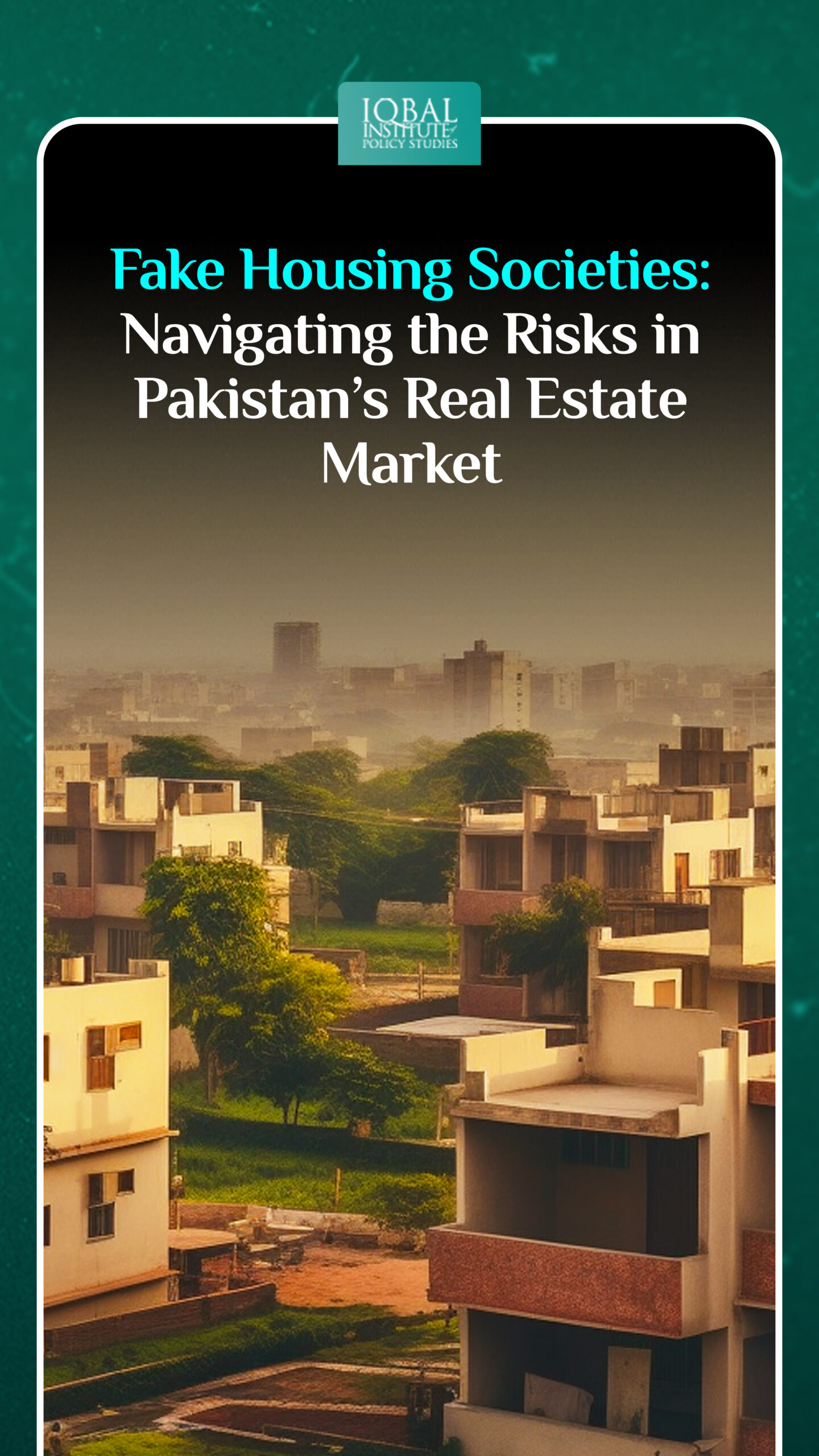Pakistan has always been seen as an appealing site for real estate investment due to its broad market, developing economy, and huge and youthful population. The current scenario in Pakistan, as well as the fluctuating dollar rate, have made it even more enticing for Pakistanis living abroad to invest in the country’s real estate market. However, a troubling trend has surfaced amid this economic frenzy: the proliferation of unlawful housing societies in Pakistan. These housing enterprises pose significant risks to naïve buyers, occupants, and the country’s urban ecology as a whole. Making sure that the property is legally original and genuine is a basic headache for both the average person and a real estate agent. Moreover, doubtful real estate companies and unapproved housing societies have captured a substantial amount of wealth. In contrast to the current cumbersome procedures of documentation and uncertain legal backing, the government must implement a well-structured, transparent, and centralised system for investors. After granting industry status to real estate, the government should establish an industry regulator, define standards for land acquisition and ownership, and register all property consultants and projects.
What are Fake Housing Societies?
Fake housing societies are unlicensed and often illegal residential or commercial enterprises that pose as legitimate real estate developments. They operate outside the reach of regulatory authorities and disregard the required approvals, NOCs (No Objection Certificates), and compliance for authorised building. These rogue developers take advantage of the rising need for inexpensive housing, attracting potential purchasers with promises of prime locations, appealing facilities, and enticing payment options.
Risks and Consequences of Investing in Fake Housing Societies
Financial Loss
The most immediate and apparent risk is the potential for financial loss. Investors who put their money into a fake housing society may never see a return on their investment, as these projects often lack the necessary approvals and may never be completed.
Legal Troubles
Engaging in transactions with unauthorized and illegal housing schemes can lead to legal troubles for buyers and investors. Authorities may take action against individuals associated with fake housing societies, leading to legal battles and additional financial burdens.
Lack of Infrastructure and Amenities
Fake housing societies frequently fail to deliver on promised amenities and infrastructure. Buyers may find themselves without access to basic services such as water, electricity, and proper roads, making it difficult or impossible to live or develop the property.
Delayed Possession or No Possession
Even if construction begins, fake housing societies often face delays, sometimes indefinitely. This leaves buyers waiting for possession and unable to utilise or monetise their investments.
Safety and Quality Concerns
Many fake housing societies compromise on construction quality and safety standards to cut costs. This poses risks to residents’ safety once they occupy the properties.
Impact on Credit Score
Buyers who financed their purchase through loans may face serious financial consequences if they default on payments due to a fraudulent project. This can significantly damage their credit score and future borrowing opportunities.
How to Spot a Fake Housing Society?
It can be difficult to spot a fake housing society, but there are numerous red signals that can help one identify potential risks.
Lack of Legal Documentation
Genuine housing societies possess proper legal documentation, including approved master plans, NOCs, and land titles. Always demand to see these documents and verify their authenticity with the relevant authorities.
Suspicious Low Prices
If the prices quoted appear to be too good to be true, they most likely are. Fake housing societies frequently entice buyers by providing much lower prices than nearby legal projects.
Uncertain Ownership and Management
Reputable developers are proud to display their credentials and track records. When a developer is vague about ownership or management, it may suggest a lack of credibility.
Lack of Physical Infrastructure
While fake housing societies may have fancy websites and brochures, the projects frequently lack essential infrastructure such as roads, utilities, and community facilities.
No-Show or Incomplete Projects
If the developer has been pushing the project for an extended period of time with no visible development, be wary as this could signal false intents.
Pressure Tactics
Beware of developers or agents who use high-pressure sales tactics to push individuals into making quick decisions. Reputable developers allow buyers ample time to consider their options.
Lack of Transparency
A lack of transparency in project details, payment terms, or hidden charges should raise alarm bells. Always seek clarity on every aspect of the purchase before proceeding.
The Way Forward
Navigating the risks linked to fraudulent housing societies in Pakistan’s real estate industry necessitates a multi-pronged approach involving a variety of players. The following are some actions that can be made to address this issue.
Strong Regulatory Framework
The government should establish and enforce a robust regulatory framework specifically targeting fake housing societies. This includes streamlining the process of obtaining approvals and NOCs while implementing stringent penalties for developers operating outside the legal parameters.
Public Awareness Campaigns
Launching public awareness campaigns can play a vital role in educating potential homebuyers and investors about the risks of fake housing societies. These campaigns should emphasise the importance of due diligence and guide buyers on how to identify and avoid fraudulent schemes.
Transparency and Accountability
Developers must be held accountable for their actions, and transparency in project documentation and financial transactions should be mandated. Reputable developers should proactively disclose information, building trust with potential buyers.
NOC Verification Mechanism
The government should create an easily accessible online platform where buyers can verify the authenticity of a project’s NOC and other approvals. This will empower buyers to make informed decisions.
Empowering Regulatory Authorities
Strengthening the capabilities and resources of regulatory authorities, such as the Pakistan Real Estate Regulatory Authority (PRA), can help in efficiently monitoring and penalising fraudulent developers.
Industry Collaboration
Collaboration between regulatory bodies, industry associations, and real estate developers can help identify and report fake housing societies promptly. Developers should also play a role in exposing fraudulent entities operating within the industry.
Encourage Whistleblowing
Encouraging and protecting whistleblowers who report illegal housing schemes can be an effective way to bring fraudulent developers to light and prevent further victims.
Industry Accreditation and Certification
Introducing industry accreditation and certification processes can help in distinguishing legitimate developers and projects from fake ones. Accredited developers should adhere to higher standards of integrity and ethics.
Enhanced Consumer Protection
Strengthening consumer protection laws and establishing dedicated bodies to address real estate grievances can provide buyers with recourse in case of fraud or misrepresentation.
Promote Affordable Housing
Addressing the demand for affordable housing through legitimate means can reduce the appeal of fake housing societies, which often lure buyers with unrealistically low prices.
Real Estate Education
Introducing real estate education as part of the school curriculum and promoting real estate literacy can equip the future generation with the knowledge needed to make informed decisions in the real estate market.
Conclusion
As the demand for affordable housing continues to rise in Pakistan, the allure of fake housing societies remains a persistent threat to potential homebuyers and investors. By understanding the red flags and taking necessary precautions, buyers can navigate through Pakistan’s real estate market more safely. It is essential to stay vigilant, verify all documentation, and seek advice from real estate experts and legal professionals before making any investment. By doing so, individuals can protect their hard-earned money and turn their dream of owning a home into a reality without falling prey to fraudulent schemes.
This article is written by Haneen Gul. Haneen is a research analyst at the Iqbal Institute of Policy Studies (IIPS).



Leave a Reply